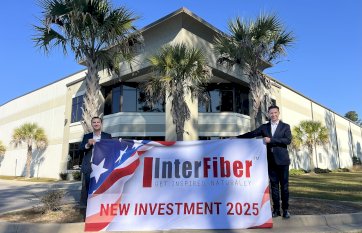An interview with Łukasz Bednarek, Key Account Manager for the technical industry at Interfiber
- Interfiber is a company founded with the food industry in mind. For several years of the company's existence, one hundred percent of customers came from this sector. What made the company establish a separate unit responsible for cooperation with technical industries?
- Dietary fiber well known in the food industry has also found its application in the form of powdered cellulose in non-food industrial sectors. At some point, we realized that fiber is a universal raw material, and thinking only about the food industry definitely limits the number of our customers. It was a tempting thought, especially considering the number of industrial sectors in which powdered cellulose is used.
- What industries can use dietary fiber?
- Powdered cellulose, thanks to their universal properties, are successfully used in the construction chemicals industry, plastics production, in the pharmaceutical and cosmetic industries, in filtration processes and many others. As a raw material of plant origin perfectly fit into the current requirements and trends of the philosophy of eco-friendly materials and thus increase the attractiveness of products on the market.
- What are the benefits of using it for producers?
- The benefits of using powdered cellulose in non-food products are both technological - facilitating production, and improving the physical properties or appearance of the product. So, foremost, they improve and allow you to control the rheological properties of the finished product. Thanks to the possibility of building 3D structures, powdered cellulose are a natural reinforcement for the finished product. By strengthening the materials in which they are found, they prevent them from cracking and make them resistant to scratching. It is an excellent filler, thickener, emulsifier and coating agent, and materials with their addition are easier to form. Powdered cellulose binds the material firmly, creating a homogeneous structure with it, which stabilizes the finished product.
- Among such a number of benefits, each of the producers can find a solution to their problems appearing on the production lines!
- But that's not all. The benefits can be multiplied: added to plastics reduces their flammability, cellulose fibers and powders can be dyed, but at the same time powdered cellulose in white gradation enhances the effect of whiteness in the finished product, where this color is desired!
For me, the most interesting application that has been tested is the production of brake linings in which fiber replaces asbestos! Linings with the addition of powdered cellulose, apart from the pro-ecological aspect, are characterized by quieter operation and longer life.
- That's a lot of information! Will the expansion of the range of industries served in any way affect Interfiber's existing cooperation with customers from the food industry?
- Absolutely not. The department supporting technical industries is a completely separate department in the company and in no way interferes with the work of technologists and traders serving the food industry. They are the best specialists in the industry and have unique expertise in the use of fiber in food production. After all, cooperation with the food industry is the basis of Interfiber's activity!
- Thank you for the interview!





